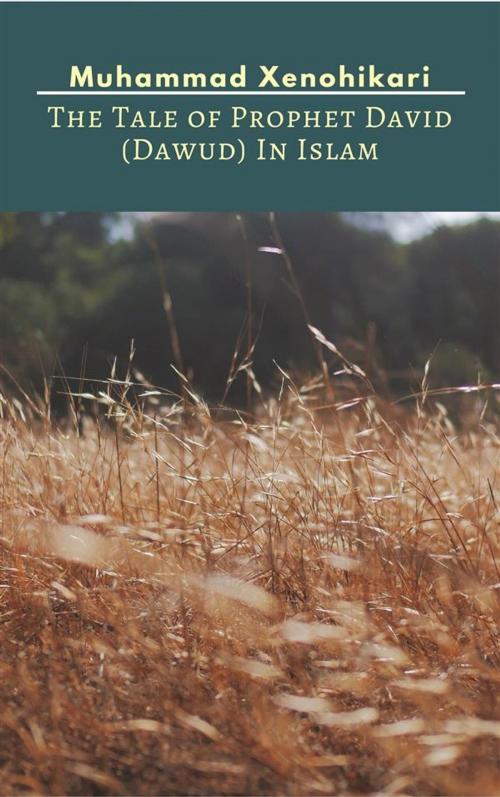The Tale of Prophet David (Dawud) In Islam
Science Fiction & Fantasy, Historical, Science Fiction, Adventure, Horror| Author: | Muhammad Xenohikari | ISBN: | 9781536561869 |
| Publisher: | Muhammad Xenohikari | Publication: | September 5, 2016 |
| Imprint: | Language: | English |
| Author: | Muhammad Xenohikari |
| ISBN: | 9781536561869 |
| Publisher: | Muhammad Xenohikari |
| Publication: | September 5, 2016 |
| Imprint: | |
| Language: | English |
Prophet Dawud or David is recognized in Islam as a prophet, messenger (Rasul), and lawgiver of God, and as a righteous king of the United Kingdom of Israel, which itself is a holy country in Islam. He similarly figures prominently in the Torah and the Old Testament of the Christian Bible. David is perhaps most famous in Islam for defeating the Philistine giant Goliath (Jalut), when he was a soldier in the army of King Saul's (Talut).
His genealogy goes back through Judah, the son of Prophet Jacob (Ya'qub), to Prophet Abraham (Ibrahim). The figure of Prophet David is of extreme importance in Islam because he was one of the few prophets to receive a named revealed book. It says in the Quran that the Zabur, the Biblical Psalms, were given to David. David's son, Prophet Solomon (Sulaiman), took over the task of prophecy after his death and he was made the subsequent King of Israel.
The Judeo-Christian and Islamic views of David, however, differ in some aspects. Muslims generally do not accept the sins of adultery and murder attributed to David in the Hebrew Bible, as they feel that prophets – in their belief the utmost chosen and elect of God – would never commit such grave crimes.
Islamic belief holds that God taught David the making of armour. The Quran says the 'iron was made soft for him', through which David could make instruments for protection against enemies. However, the rule in this story is to use weapons of defence only in true war (e.g., if you are fighting for freedom of worship) and not to simply use weapons for degenerate violence. Later accounts in Muslim literature have references to David's armour-making abilities. God says in the Quran:
We favoured David with excellence, (and commanded): "O mountains and birds, glorify the greatness of God with him." And We made iron pliable for him. "Make long coats of mail," (We said), "and fix their links, and do the right. I surely see whatsoever you do." (Quran, surah 34 (Saba), ayat 10-11)
David was a man of superb strength, slaying Goliath in his raw youth. But God afterwards had bestowed upon him various gifts, including those of kingship and prophethood. Thus, the wise king would frequently praise God, in unison with the nature around him. Many scholars believe he was given the gifts of music as well, and would sing his prayers too, as he was blessed with great eloquence. The Quran mentions David's praise of God:
Bear with patience what they say, and remember Our votary David, man of strength. He surely turned to Us in penitence. We subjugated the chiefs (of tribes) to struggle day and night with him, And the levied birds. They were all obedient to him. (Quran, sura 38 (Sad), ayat 17-19)
Prophet Dawud or David is recognized in Islam as a prophet, messenger (Rasul), and lawgiver of God, and as a righteous king of the United Kingdom of Israel, which itself is a holy country in Islam. He similarly figures prominently in the Torah and the Old Testament of the Christian Bible. David is perhaps most famous in Islam for defeating the Philistine giant Goliath (Jalut), when he was a soldier in the army of King Saul's (Talut).
His genealogy goes back through Judah, the son of Prophet Jacob (Ya'qub), to Prophet Abraham (Ibrahim). The figure of Prophet David is of extreme importance in Islam because he was one of the few prophets to receive a named revealed book. It says in the Quran that the Zabur, the Biblical Psalms, were given to David. David's son, Prophet Solomon (Sulaiman), took over the task of prophecy after his death and he was made the subsequent King of Israel.
The Judeo-Christian and Islamic views of David, however, differ in some aspects. Muslims generally do not accept the sins of adultery and murder attributed to David in the Hebrew Bible, as they feel that prophets – in their belief the utmost chosen and elect of God – would never commit such grave crimes.
Islamic belief holds that God taught David the making of armour. The Quran says the 'iron was made soft for him', through which David could make instruments for protection against enemies. However, the rule in this story is to use weapons of defence only in true war (e.g., if you are fighting for freedom of worship) and not to simply use weapons for degenerate violence. Later accounts in Muslim literature have references to David's armour-making abilities. God says in the Quran:
We favoured David with excellence, (and commanded): "O mountains and birds, glorify the greatness of God with him." And We made iron pliable for him. "Make long coats of mail," (We said), "and fix their links, and do the right. I surely see whatsoever you do." (Quran, surah 34 (Saba), ayat 10-11)
David was a man of superb strength, slaying Goliath in his raw youth. But God afterwards had bestowed upon him various gifts, including those of kingship and prophethood. Thus, the wise king would frequently praise God, in unison with the nature around him. Many scholars believe he was given the gifts of music as well, and would sing his prayers too, as he was blessed with great eloquence. The Quran mentions David's praise of God:
Bear with patience what they say, and remember Our votary David, man of strength. He surely turned to Us in penitence. We subjugated the chiefs (of tribes) to struggle day and night with him, And the levied birds. They were all obedient to him. (Quran, sura 38 (Sad), ayat 17-19)















